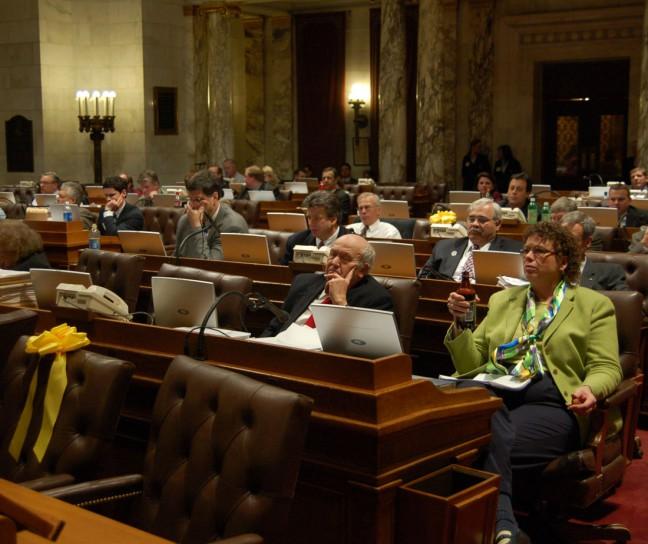With University of Wisconsin’s public authority model effectively scrapped and legislators seeking a smaller cut to state funding, there will certainly be continued discussion of how these funding changes affect the state’s financial well-being. Unfortunately, Wisconsin, like many states, tends to devolve into a low level of political discourse with wild accusations of fiscal malfeasance on all sides. I want to clarify a few commonly misunderstood or misused terms that you will read in the coming weeks and, undoubtedly, during the next election cycle.
“Balanced budget” is the most egregiously misused phrase in state politics. Gov. Scott Walker — likely along with every governor Wisconsin has ever had — has campaigned to thunderous applause that he balanced the budget and made tough choices on spending. What the governor and his predecessors leave out is the constitutional requirement that Wisconsin has a balanced budget. We literally cannot have anything but a balanced budget, making the term absolutely nonsensical at the state level. All states except Vermont also have this requirement, meaning whenever you heard a governor drone on about how they balanced the budget from a large deficit, they’ve simply been doing what the law already requires of them.
Deficits and surpluses are also related to balanced budgets, but have a vastly different meaning than when the federal government talks about them. Wisconsin passes a budget on a two-year cycle, meaning the budget lawmakers are discussing today in the Legislature will be effective from July 1, 2015 through June 30, 2017. In the context of a state budget, a deficit simply means the state has spent more than it has taken in by June 30. In effect, a state cannot have an actual deficit because, by law, all expenditures must have a matching source of revenue. When a political candidate rants about inheriting a $3.6 billion deficit from his predecessor, as Walker did in 2010, he is counting on the voters not understanding the difference.
Despite the misleading nature of these statements, they often are not explicit lies. Usually, the candidate is referencing the projected deficit, which can fluctuate wildly, making it incredibly frustrating to find the truth. A projected deficit or surplus is based on complex projections for how much revenue the state can expect during a given time. Specifically, a candidate would claim they inherited a $3.6 billion deficit, meaning the latest projections show that revenue would fall short of expenditures by $3.6 billion. These projected figures are incredibly easy to manipulate, and then you get stories of candidates miraculously eliminating a massive “deficit” when they did nothing of substance to accomplish this.
As I mentioned before, projected deficits are based on projected revenue and expenditure calculations for the state. Because these projections are based on information at a given moment, they will naturally fluctuate when updated for new information. If in December a firm says job growth will be 2 percent in the next year, the revenue projections will reflect that level of income tax and economic activity. However, if the job growth projections grow to 10 percent, and the revenue projections are calculated again, the amount of tax revenue and economic activity will grow. The end result would be a shrinking projected deficit when the governor did nothing except recalculate the formulas — a free and easy deficit reduction that the voters will eat up as if the governor toiled away furiously to save money.
There are other methods to reduce the projected deficit without any substantial changes to spending habits or taxing strategies. One of the most prominent of these is simply not paying the state’s bills on time. If a bill comes due in June of the end of a budget cycle, you can bet there is a good chance that bill will be postponed until the next fiscal year. The candidate can achieve instant deficit reductions for doing literally nothing but delaying payment. Additionally, in some limited instances, the state can borrow money to cover shortfalls.
However, unlike the federal government, the state cannot take on debt for operating spending, so debt does not have the same meaning. The only exception to this rule is for infrastructure improvements like roads and highways. The transportation fund can therefore spend far in excess of its current revenues and make up the difference by borrowing against future revenues, which Walker is doing to the tune of over $1.3 billion in this budget. This is a crafty move because it allows Walker to spend more money than the tax revenues would support, thus avoiding the state’s constitution by sticking the funding in the transportation budget. It is also a crafty way to effectively increase taxes because transportation typically does not generate new revenue to cover the interest.
All state politicians use this confusion to their benefit, both Democrat and Republican. But as voters, it is important to understand the words they use so we are not taken in by cheap political messaging about misunderstood topics like deficits or balanced budgets.
Adam Johnson ([email protected]) is a masters candidate at the La Follette School of Public Affairs.





















